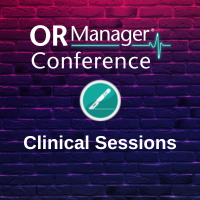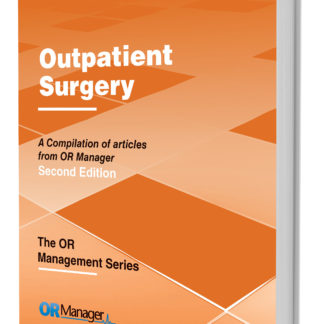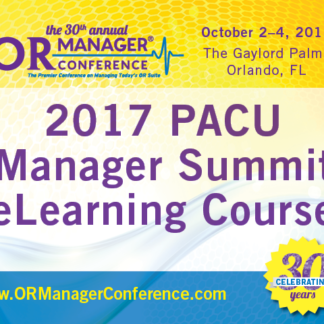Description
The Clinical sessions are designed for OR leaders who have a passion for training and mentoring their teams. Focusing on patient safety first, this track will help clinical educators improve communications, develop cross-functional teams, advocate for policy change, improve the quality of care and increase patient satisfaction.
Sessions include:
Top Trends in SPD: Staffing, Compliance and Standardization – What You Need to Know! Sponsored by: STERIS
Sterile Processing is key to the success of any OR. Ensuring you have the right systems in place requires knowledge and predictable processes to meet daily OR needs. Hear how Rush University Medical Center in Chicago teamed up with STERIS to standardize their operations and culture leading to improved staff and leadership engagement and performance. Not only are staff following proper procedures every time, their work on missing instruments saved over $600,000 in instrumentation spend as well as impressed and surpassed expectations for The Joint Commission visit. Attend this session to receive the latest updates on sterile processing standards, compliance and how to assemble the right team.
Learning objectives:
- Learn how SPD can provide the OR what they need every day – in a predictable and reliable manner.
- Understand how to comply with ST91 Scope Requirements – even if you don’t care about scopes.
- Discuss the advantages of standardizing to an SPD Playbook – ensuring every process is completed in a predictable and uniform manner no matter who is doing the work.
Pre-habilitation: An Innovative Approach
The traditional model of pre-op clinics and pre-admission testing are designed to coordinate a perioperative plan of care and provide patient education. But for high-risk surgical patients, a better approach to pre-admission is needed to ensure improved patient outcomes.
Hear how one facility developed a “Pre-habilitation” optimization clinic for high-risk patients, engaging them weeks before surgery to improve co-morbid medical conditions. Learn how they decreased the rate of complications and improved patient outcomes through collaboration with various service lines, primary care, senior leadership, nursing and anesthesia.
Learning objectives:
- Discover the benefits of a “Pre-habilitation” clinic for high-risk surgical patients.
- Learn communication tools to collaborate across teams to improve pre-surgical plan of care.
- Evaluate processes to decrease the rate of adverse events and improve patient outcomes.
Preceptor Training is Vital to the Success of the OR
Precepting is vital to helping new nurses achieve the critical skills necessary to ensure patient safety in a new environment. Hear from one facility on their educational endeavors to mentoring new staff and how they implemented a successful program across their health system. Plus, hear how they transitioned experienced nurses from other specialties into their perioperative fellowship program. This session will provide you with a step-by-step guide to developing an effective preceptor training program at your facility.
Learning objectives:
- Understand best practices in transferring knowledge and skills when orienting.
- Learn how to provide constructive feedback to empower the novice learner.
- Discover how effective preceptor training can serve as a powerful retention tool.
Navigating a Quality Improvement Project in the Dynamic World of the OR
Quality Improvement (QI) projects in the OR are essential to remain competitive and provide the highest standard of patient care. While QI projects are essential to running a highly efficient OR, the introduction of new technologies and service lines can pose challenges for staffing, processes and workflows.
Hear from one facility how they introduced a new service line procedure that was traditionally performed in the radiology department and transitioned to a state-of-the-art hybrid OR. Understand how they navigated the new environment, the training required, and the steps they took to improve workflows during the transition.
Learning objectives:
- Develop a plan to ensure safe patient care during a QI project.
- Learn how to effectively manage workflows during transitional change.
- Improve team communications and efficiencies while implementing a QI project.
Surgical Smoke Legislation – A Case Study to Enact Meaningful Change
In 2023, Oregon joined three other states in passing legislation requiring smoke evacuation in all surgeries likely to generate surgical smoke. The legislative process began in 2011 and took nurses and other OR stakeholders over a decade to change the culture in the OR and change the law.
This case study will start with the background of the concern, institutional history and failed change management. It will also outline the process by which OR clinicians and leaders engaged with lawmakers and professional bodies to draft and support legislation to require smoke evacuation in the OR. This includes having constituent meetings with lawmakers and providing testimony to state congressional committees as well as coming to compromise with those groups opposing the bill language.
Learning objectives:
- Understand the importance of nursing engagement in advocacy to progress the profession.
- Learn how to connect with professional bodies to understand what current nursing practice issues are being discussed in legislation.
- Understand why legislators need to hear directly from nurses and nurse leaders.
A Little Country and a Little Rock-and-Roll: Rural Systems Teaming Up with Tertiary Hospitals
Rural hospitals play a critical role in healthcare advocacy and care to their community just as large tertiary hospitals do. However, few healthcare providers for either side understand how closely rural and urban hospitals work together to provide their community with the care they need through strategic planning and affiliations. Rural hospitals are small but mighty as they work with their tertiary counterparts to meet the needs of their communities. This session will focus on educating the OR nurse on the role of rural and tertiary surgical staff and compare their clinical importance to each of the communities they support together and individually.
Learning objectives:
- Learn how rural and tertiary hospitals can work together to provide better patient care.
- Understand the importance of both types of health systems.
- Develop an education plan for OR nurses to support each other and serve their community.
Reducing Opioid Exposure Through a Multimodal Analgesic Virtual Reality Program
The opioid crisis continues to be a public health concern. Traditionally, an opioid-centric approach treats postoperative pain. Incorporating a multi-modal analgesic Virtual-Reality (VR) program can allow for nursing adoption of novel evidence-based practices (EBP) and promote the use of non-opioid and non-pharmacological interventions. The practice of incorporating multi-modal analgesia as a standard workflow can improve patient outcomes.
Learning objectives:
- Examine ways to decrease opioid exposure in the post-surgical patient.
- Learn how to implement a multi-modal analgesic quality improvement program.
- Discover why Virtual-Reality (VR) is a preferred method for pain control to improve patient outcomes.
To learn more about the sessions, visit: 2023.ORManagerConference.com/conference



